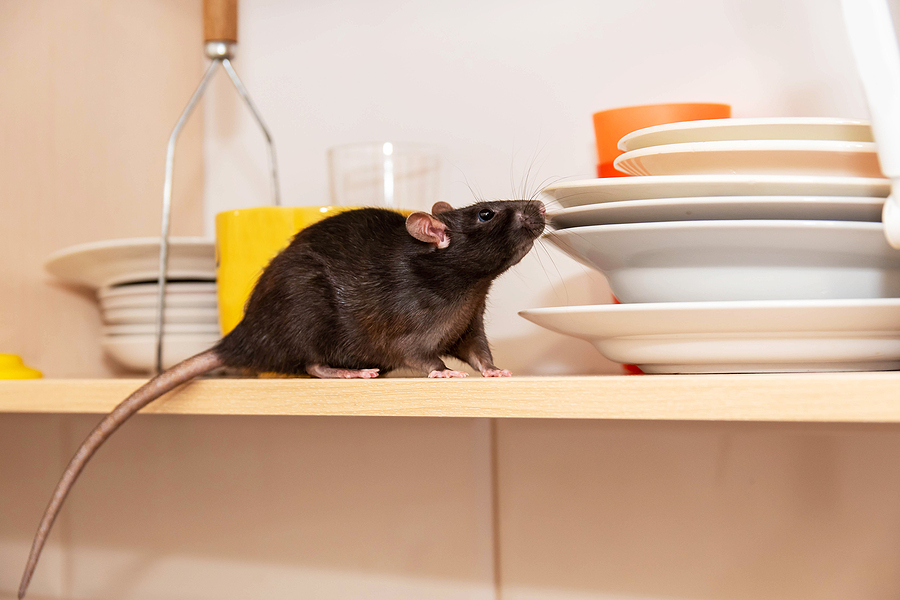5 Types of Rodents in The Region
- Details

Whether you're experiencing exterior or interior pest concerns, knowing more about the species, the potential risks of an infestation, and what actions to take is vital to keep them under control.
While some types of rodents are more common than others, many of them can become a nuisance. The rodents we will discuss here are some of the most common that inhabit this region and where you might encounter them.
1) Norway Rat
A common rodent is the Norway Rat. Unlike other rats, this rodent prefers lower-level dwellings such as basements and piles of debris. Rats are notorious for causing damage when they infest interior areas. Besides ruining food supplies they are also known to chew electrical wires.
Once they've discovered an entry way they can quickly multiply. Although these rats are quite large, growing up to 18 inches long, they can remain hidden. One of the first signs of a rodent infestation will be droppings they leave behind.
2) Field Mouse vs House Mouse
The field mouse, also known as a deer mouse, prefers to live in outdoor areas such as wood piles, yard debris, and mounds of soil. Although they prefer exterior spaces they are sometimes found indoors and are good at remaining unseen as they seek out food.
The more common house mouse is known to live its whole life inside where they can nest and eat food. Generally, they will reside in walls, attics, and any other spaces that provide quiet nooks to hide in. There are some visual differences between the two species. One notable difference is that field mice have a white underbelly and a fuzzy tail whereas the house mouse does not have these distinct features.
3) Nutria (non-native)
The Nutria is not native to this area but as noted by The Virginia Department of Wildlife Resources it has become increasingly common. Originating in South America, they were bred during the 1800s for their fur, but when the fur trade collapsed in the 1940s they ended up in the wild. They are mostly found in portions of the region that provide necessary aquatic environments in which they thrive.
These nocturnal rodents are as destructive as they are crafty, building dens and nesting platforms about 2 feet wide and half a foot above water. The burrowing and their preferred appetite for aquatic vegetation are detrimental to marshes and wetlands. Potentially causing permanent destruction to areas they inhabit.
4) Gray Squirrel
Squirrels are a well-known rodent boasting over 200 species worldwide. This region has a few species but the common Gray Squirrel is the one most often seen. They are found virtually everywhere whether it's a rural countryside or city neighborhoods. Trees are their preferred nesting areas yet they will take up residence in attics and other spaces they can find their way into.
Once they get indoors they will nest and run around, in fact hearing them as they scurry around is common. Typically they will seek out areas that provide exterior access to food. Damage can be caused as they chew wood and other building materials.
5) Woodchuck (Groundhog)
The common groundhog also known as a woodchuck is a rodent found outdoors and can live in rural and urban areas, feeding mainly on vegetation. Their preference to eat plants and plant matter can make them a nuisance around gardens and landscapes.
They will dig tunnels underground to travel and will also hibernate underground. The digging and tunneling they are known for can result in extensive damage to gardens and lawns. Shrubs and small trees also can quickly fall victim to a family of groundhogs when they inhabit nearby surroundings.
What to do if you suspect a rodent infestation
Of course, an infestation of mice or rats may be more concerning than other rodents who tend to stay outdoors. Parasites like fleas and mites as well as bacteria can be spread by these rodents.
It's important to take action if you suspect a pest problem. Hiring a professional pest control company is your best line of defense. Eagle Pest Services makes it easy to get started so you can rest assured that your home or business is protected. Contact us today at 1-(866) 281-1822 or schedule an inspection online.





